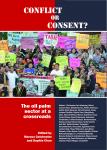16 Dec 2013
This is the concluding chapter of 'Conflict or Consent? The oil palm sector at a crossroads'.This chapter looks at the conclusions and recommendations to be made from the studies within this document.The findings of these studies expose the gulf that exists between the law and the RSPO standard and point to the urgent need for governance and legal reforms to adequately protect community rights from expropriation and provide just remedies for abuses. Equally critical are development processes achieved through legal, policy and governance reforms to protect indigenous peoples’ and farmers' land rights, prevent ‘land grabs’, ensure fair processes of negotiation over land, build community capacity and ensure mechanisms for the resolution of land conflicts. Full supply chain traceability is needed in which environmental protections are matched with comprehensive protections of human rights. Such accountability should equally apply to investors. Widespread and effective compliance with the RSPO standard depends on respect for human rights, good governance, transparency, accountability, rule of law and access to justice. While the RSPO standard itself needs to be strengthened and enforced, so long as national laws and policies allocate lands to companies without respect for community rights, company compliance will be hard to achieve and further conflict inevitable.












